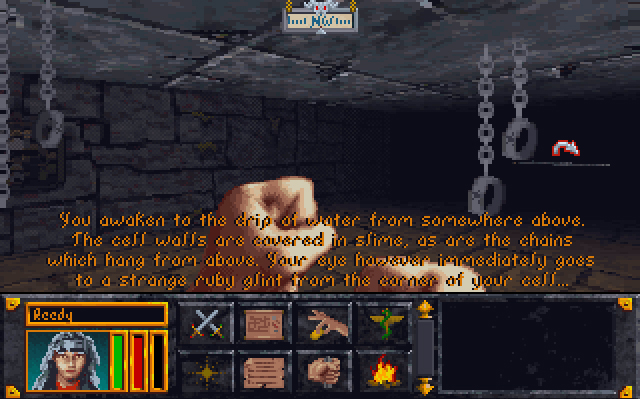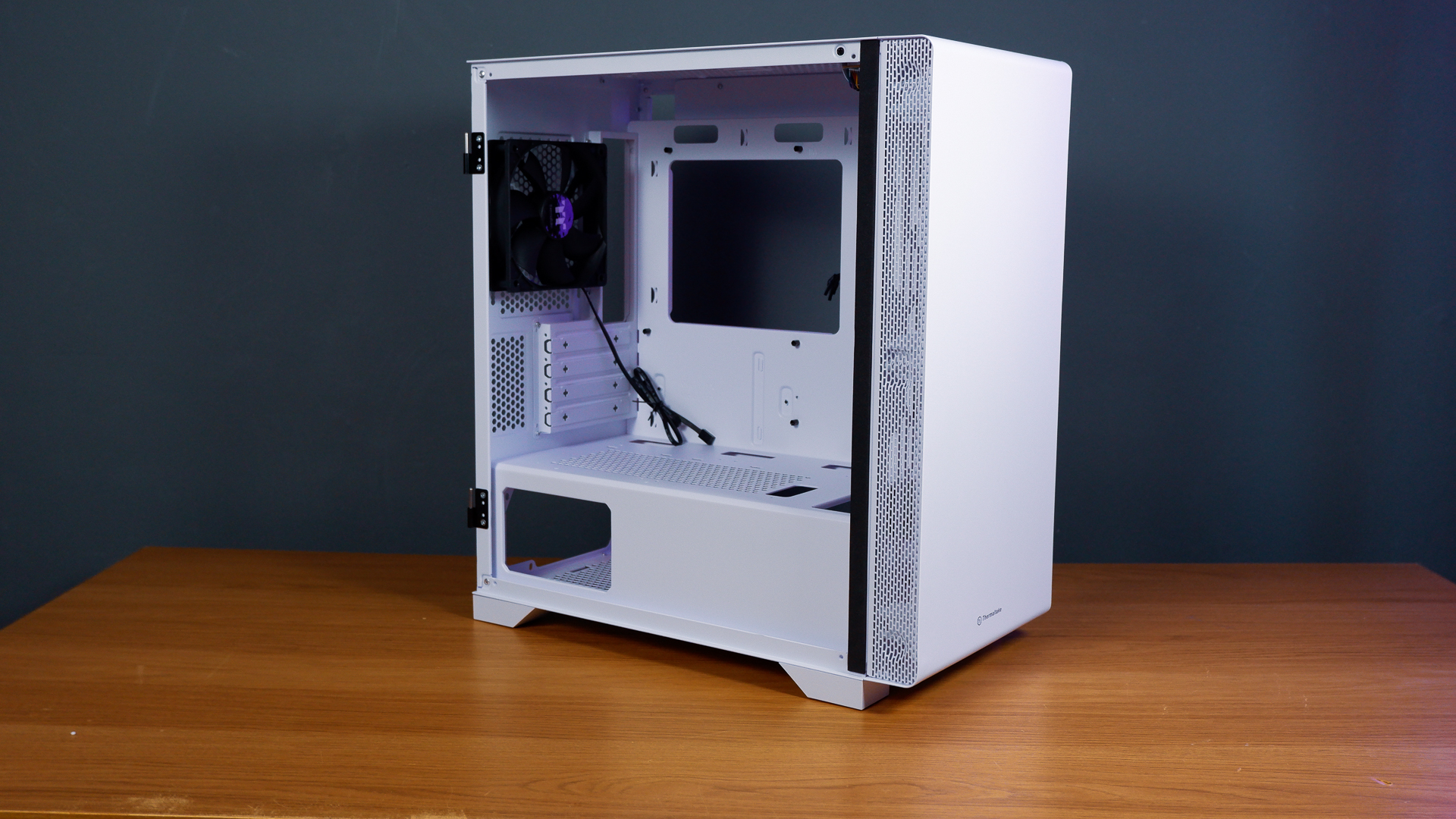Our Verdict
A stunning technological achievement; give this game a better storyline, and you might have the best FRP ever designed.
PC Gamer's got your back
Tyler Wilde provides commentary before our original review of the first Elder Scrolls game from the debut issue of PC Gamer US.
Oh, how fast things can change—no one says "FRP" to refer to fantasy role-playing games anymore, the 1994 Summer Consumer Electronics Show, which predated the first E3 by a year, was visited by Sierra On-Line, Interplay, and MicroProse, and had things gone a little differently, we might be playing Terminator Online instead of The Elder Scrolls Online.
20 years ago, "upstart" developer Bethesda Softworks was best known for three DOS games based the James Cameron films, but it sealed a very different future when it released The Elder Scrolls: Arena, which we called a "tour de force" and "a stunning technological achievement" in the May/June 1994 debut issue of PC Gamer US.
One of the most interesting things about this review is how the graphics were praised for replicating effects like fog, firelight, and reflective water. When I think of Skyrim, I see comparable details: the way snow swims around mountaintops, the transparency of streams, the flicker of flames. 10 or 10,000 polygons, it's still the little moments when physics and light do something we recognize from the real world that create a convincing sense of place.
My favorite thing about this 20-year-old review is how it approaches gestating fantasy game tropes with fresh eyes, exclaiming that you can complete the game as an assassin character (!), but also finds familiar criticisms, such as the lifelessness of NPCs, which is something that hasn't improved as much as I'd have expected after 20 years of character scripting, animation, and voice acting. A lot has changed since 1994, but so much has stayed the same.
***
The Elder Scrolls, Volume 1: Arena review
_Bethesda's first fantasy role-playing game is a graphic tour de force
that already has fans drooling for more.
Oh, how fast things can change—especially when it comes to fantasy role-playing games (FRP's). This genre, which looked to be undergoing something of a renaissance after last summer's CES in Chicago, is in a limbo of sorts. Twin Dolphin Games' Forgotten Castle, which looked incredibly promising, is both dead and forgotten. Dynamix's Thief of Dreams, the sequel to the mesmerizing Betrayal at Krondor, is in limbo, and SSI will soon no longer be developing TSR's Advanced Dungeons & Dragons games. And Stonekeep, Interplay's gorgeous 3D first-person dungeon crawl, seems to be perpetually hanging around the corner, just out of reach.
The time is ripe for an upstart, and Bethesda Softworks is ready for the job. The company that brought us three Terminator games has unveiled its debut FRP, The Elder Scrolls, Volume 1: Arena—and it's simply stunning.
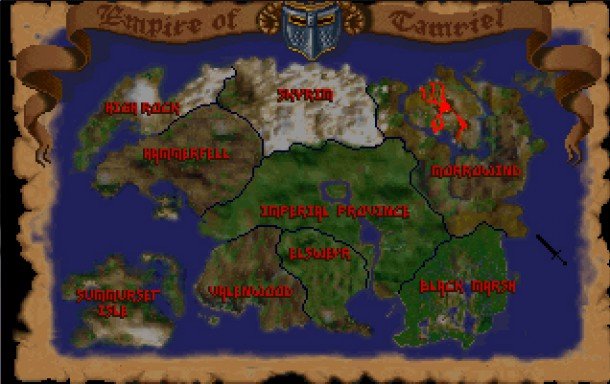
Like Origin's Ultima Underworld series, Arena is a single-player fantasy role-playing game featuring smoothly scrolling 3D graphics, presented from a first-person point of view; unlike Ultima Underworld, Arena doesn't limit your explorations to subterranean settings. There's an entire world to explore here, with myriad villages, cities, and dungeons (of course) awaiting you, all rendered in jaw-dropping 3D graphics. While Arena's graphics engine isn't quite as sophisticated as Ultima Underoworld's (you can't look up or down, for example), it's still mighty impressive.
Bethesda has created a true virtual world, using light-sourcing and shadows to magnificent effect. Puddles on rain-soaked streets reflect lightning bolts in the distance; fog, snow, and mist impair your vision as you move through the countryside; you can discern caverns lit by firelight in the distance, and peek through keyholes before entering potentially dangerous rooms.
"Expect to find yourself whirling around in your chair to see if a nasty is creeping up behind you."
Arena's sound effects and music are up to the task as well. The game sounded simply amazing on a Sound Blaster 16/Wave Blaster configuration, with General MIDI support and stereo-panning effects heightening the experience considerably. Digitized wolf howls and the sound of shuffling zombies brought a real sense of atmosphere and anticipation. Expect to find yourself whirling around in your chair to see if a nasty is creeping up behind you.
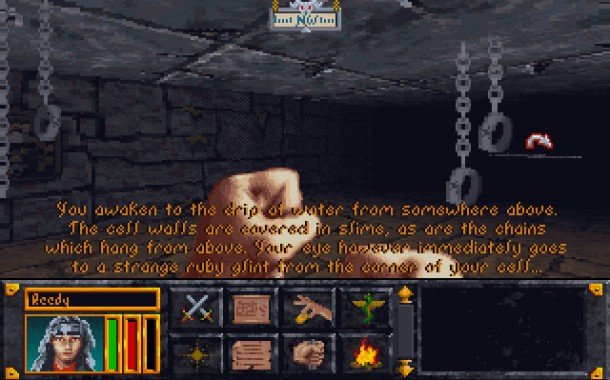
But there's one area in which Arena could stand some improvement—the storyline. The plot seems rather shallow compared to games like Betrayal at Krondor or Ultima VII, and could never stand alone as a story. To be fair, though, Arena's storyline is as good or better than most of its recent peers. Here's the skinny: the Emperor's wizardly advisor-turned-traitor, Jager Tharn, has used the magical Staff of Chaos to secret the king in another dimension. This nogoodnik has also killed a sorceress friend of yours, and tossed you (as an unsavory type with possible heroic tendencies) in prison to rot, while taking the Emperor's place on the throne.
"The plot seems rather shallow compared to games like Betrayal at Krondor or Ultima VII."
The only way to rescure the Emperor is to reassemble the Staff, which has been broken and hidden in far-flung locations across the world. Your sorceress friend's life-force, held together by her magic, gets you out of your cell and starts you on your quest to kill the traitorous mage and restore the Emperor. There's much trekking through huge dungeons (what are all these dungeons doing here, anyway?) to gather items to give to non-player characters (NPC) who can give you information. This is pretty standard fantasy role-playing fare, reminiscent of The Bard's Tale II, in which your heroes had to retrieve the sections of the Destiny Wand.
But if it's standard fare, at least it's very well-implemented. Bethesda has created a unique magic system and new character classes; though you can choose your character from heroic professions like knights and rangers, you can also play as an assassin (!) and successfully complete the game. There are several classes of mage, like the Spellsword or Battlemage, whose specialty is the use of magic in combat. You can buy spells, or have fun creating and naming your own at the Mages' Guild through a simple yet flexible "spell editor."
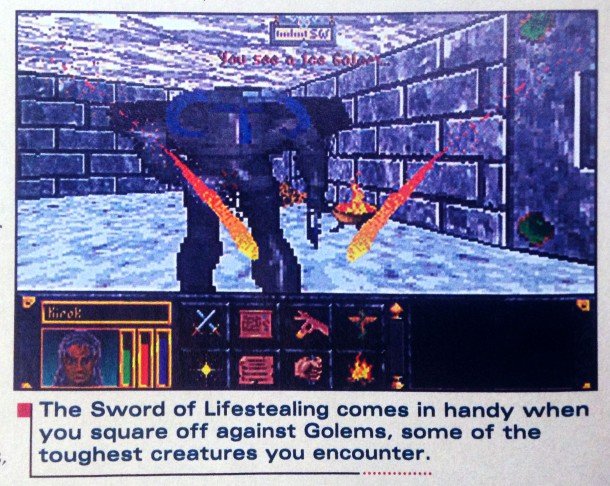
Game controls are a breeze to master. A left-click on the mouse gets you going—where the cursor is positioned on-screen determines your speed and direction. The combat system in Arena is just as smooth and natural. Click and hold the right mouse button, then move the mouse as you would the weapon you're hoisting—left to right (or vice-versa) to slash or punch, down for a smashing blow, or up to jab or stab.
"The Arena game world is littered with crypts, abandoned castles, dungeons, and huge cities."
Movement can also be controlled via keyboard control, a method I preferred to mouse-only steering. Arena also sports an automap where you can jot down descriptions and reminders; there's also a quest-management auto notepad that keeps track of the various tasks you've yet to perform.
And, oh, the places you'll go! The Arena game world is littered with crypts, abandoned castles, dungeons, and huge cities with their own indigenous population walking the streets during the daytime. You can click on passers-by and ask them their name, where the nearest inn is located, and about any rumors they may have heard.
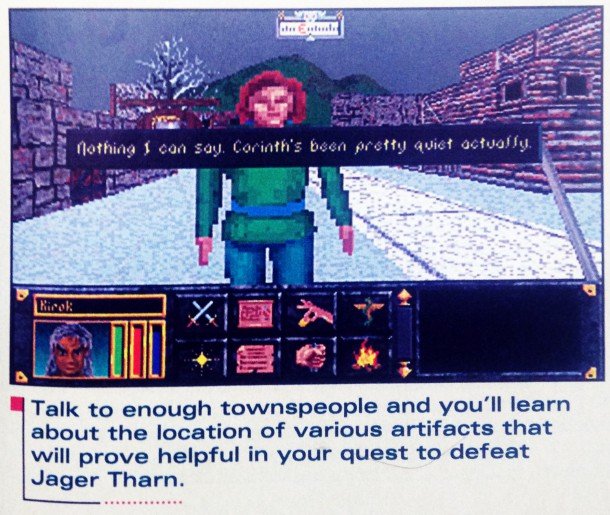
On the downside, each NPC may have his or her own name and profession, but it doesn't matter one whit to your heroine that NPC Wendel is a butcher, baker, or candlestick maker. The non-player character's identity has no bearing whatsoever on your interaction or your quest, and as a result conversations consist mostly of isolated questions and answers, never developing to reveal truly unique characters. In fact, NPC interaction is rather lifeless, with you learning things like "go find the empty shoe-polish tin of the gods in the crypt, and I'll tell you the location of the mystic dog polisher."
But despite this, Arena is still entrancing. My character has completed a few quests and is tracking down the next staff piece. There's a huge and dazzling (if a bit superficial) world to explore, more than enough to keep a jade gamer like myself playing long after I finished this review. If Arena had a better-developed story line and NPC interaction, it would be almost perfect. But stay tuned—Bethesda has cranked out a winner, the sequel may be the best FRP ever designed for computers. — Bernie Yee
Category: Role-playing
Developer: Bethesda Softworks
Publisher: Bethesda Softworks
M.S.R.P.: $69.95
Required: 3860X/33 MHz: 4 MB RAM (w/ 2 MB EMS); DOS 5.0 or later;
25 MB hard-drive space; VGA; Mouse.
We recommend: 4860X/33 MHz; Disk-caching utility;
Supported sound cards (General Midi strongly recommended).
The Elder Scrolls: Arena is still offered free from Bethesda, and can be played with DOSBox .
A stunning technological achievement; give this game a better storyline, and you might have the best FRP ever designed.
PC Gamer is the global authority on PC games—starting in 1993 with the magazine, and then in 2010 with this website you're currently reading. We have writers across the US, Canada, UK and Australia, who you can read about here.
